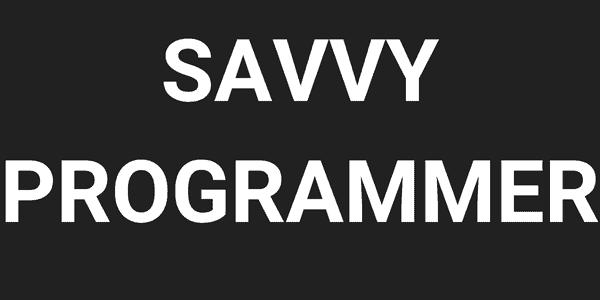Whether you are new to computer programming or someone who has been writing code for some time but finds it difficult to improve the quality of your code and make it consistent?
This reading will introduce you to 10 tips that if used, can significantly polish-up your coding skills while enhancing the code quality.
Follow proper indentation rules
Indentation plays a great role in improving code quality, as it makes your script neat and easier to read. Make a habit of following indentation rules vven if you’re writing 10 lines of code. This will increase the readability of code and saves a lot of time when reading and understanding it since there is much less noise.
Programmers always prefer to have a look into indented code because it provides visual clues that are relatively easier to see rather than counting and matching braces. This can also help unify code style and code quality across team members and improving their collaboration. Also, it will also make the codebase:
- Easier to modify or enhance
- Easier to maintain
- Easier to read and understand
To achieve proper indentation in your code, you need to use an IDE. Visual studio code is a good option because of all the cool extensions it offers!
To properly indent your code, you can install open-source libraries from visual studio code’s list of extensions which will save you the trouble of going on every line and style it.
Maximize use of Built-in libraries and functions
Always try to use already built libraries and built-in functions (of the stack you are working on) rather than writing additional code.
There is literally no need to reinvent the wheel. Reusability is a key to code quality, and any good developer will focus on getting things done by reusing any bit of code they can get, be it their own or anyone else’s.
Another advantage could be that third-party libraries are relatively easier to set up as they are properly documented and can be set up easily. A lot of man-hours are put in writing third-party libraries, so it also allows for developers to learn from other developers’ code.
However, make sure that you properly verify and choose libraries that are up-to-date and are being updated regularly. The more stable the support on the library, the less the need to replace it when your project gets scaled up or matured, leading to better code quality and success.
Use comments (only where necessary)
Comments are a great way to understand complex algorithms and logic. It is encouraged to use comments above or inline whenever working with complex tasks.
Comments do not provide a complete understanding of the logic, rather just a glimpse into what’s going on and what to expect.
Hell comes in layers, and a useless comment will just cause chaos.
However, you should not flood your code with comments. These should be added only for complex logic, and this is a rule of thumb that should be followed. If you start adding comments everywhere, then they lose their importance, and other developers will tend to ignore them.
Follow DRY pattern
The good old rule, ‘Do Not Repeat Yourself’. In any good programming environment, developers should forget the number of times they hear this one from their peers.
This is one of the most fundamental principles of the programming world and can be implemented on all frameworks and stacks. The crux of this pattern is that you need to avoid writing the same piece of code again and again.
To achieve this principle, you need to identify the repeating bit of logic in your code and write a function that contains it. Done? The rest of the part is pretty simple. Replace that logic with your function. Congratulations, you have achieved three things by following this simple practice.
- You have improved the readability of your code.
- You just wrote clean quality code.
- You just came one step closer to becoming a great developer.
Use consistent and predictable naming conventions
While developers follow different naming conventions for methods and variables
in different programming languages, the end goal remains the same, i.e., to improve coding standards and quality.
How does something as simple as naming a variable improves code quality, you ask? Well, for starters, if you’re struggling to name a method, then there’s probably no need for one, and you should continue with the calling code.
Similarly, if you’re programming in an object-oriented language, then you should be thinking in terms of state and behavior. By doing so, you can predict your methods and name them accordingly.
If your method is becoming bloated with code, then you can rethink your approach in terms of state and behavior, and you will get a path of where to proceed next.
The best approach to this is that before starting to code, you have your entire scenario planned out, and it is clear in your mind what the task at hand requires and which approach are you taking towards solving it, and then later when you dive into code things start coming naturally in your mind.
This helps you and the reader as well since the effort required to understand the code is reduced, and you can come back months later and still know what you wrote.
Refactor early and often
Our goal as developers is to write quality code, and one of these qualities is extendibility. The addition of new code is less of a risk than making changes to the existing codebase. So, if you do want to change the functionality of your code, it is much easier to do with clean refactored code.
All in all, refactoring means restructuring the existing codebase. This will help in achieving an improved and modernized internal structure of the codebase.
During this process, developers will run into loose ends, bugs, and outdated libraries that would need updating along the way. This is a one-time investment that will certainly improve the standard and performance of the code.
Prioritize error handling mechanism with proper messages
Good code should anticipate, detect and handle error scenarios to ensure the system does not break. These errors should be properly reported in the UI, and their messages should be self-explanatory. This means that the error messages should be meaningful.
Moreover, there are certain types of errors, which, if left unhandled, can leave the codebase vulnerable to cyber-attacks which is obviously a huge security risk.
Likewise, if we think from an end user’s perspective, they will only be interested in using the system if it does not crash, and if, in any case, the system is about to report an error, it should speak to the end-user in their language rather than the systems language.
For example, if a user is uploading an image and the image size is too big for that particular upload category. The system should report that the reason for failure is, ‘You cannot upload an image greater than x MB rather than throw a standard exception, ‘Your request is failed to complete’.
Listen to good podcasts and engage in coding activities
Who better to tell you how to improve your code quality than the best minds in the industry?
To do this, you need to have a social presence and follow developers related to your technological stacks, understand what they are doing and what you’re doing wrong.
Build a habit and take it from there, and with the passage of time, you will start to notice some significant changes in your codebase. You will be able to identify what differentiates a junior engineer from an experienced engineer.
In addition to podcasts, it is recommended that you sign up for audibles and listen to audiobooks during your free time. They are better structured and are centralized around a specific topic and dive deep into it directly, opening the room for some tips and tricks.
To sign up for some cool programming audiobooks, check this out.
Get code reviewed from peers or senior developers
Are you done implementing the feature? Have you fixed the reported? Have you successfully enhanced the existing functionality? Everything working like a charm?
Sounds Good! Because now it’s time to get your code reviewed. You’re probably wondering why you should get it reviewed in the first place?
Well, firstly, a review process ensures compliance of coding standards that are being followed project-wide and makes sure they are enforced upon developers.
Secondly, it is a great mentorship platform for newly hired developers and helps them to significantly up their coding game, improve their developments skills and grow professionally in short time.
Learning doesn’t only take place for the developers while getting their code reviewed.It is also an important and worthwhile experience for the one that is reviewing the code as it familiarizes them with the work that is being done on the project.
So, as you can observe, reviews should be made an integral part of improving overall code quality, which will eventually lead to better success as it is a win-win for both the developer reviewing the code and the one getting it reviewed.
No doubt it will take time initially. Changes will be requested again and again on a single PR. You will get frustrated but this is a one-time investment. Once you get a hang of the review process and the project code on which you are working, you will automatically follow the best coding practices and get your PRs approved in one go.
If you’re interested in reading further about code reviews, then you’ll find this quite intriguing.
Make a habit of reviewing the code of senior engineers
To be the best, you have to follow the best and then set the bar from there, at least, that’s what an Engineer should believe in, and so should you!
If you’re working for a company, then you may request to review some pull requests that your seniors have been working on just to get a better view of how they are handling things and how you would have done them if they had been assigned to you.
What this does is, create a curiosity that will tend to push you towards becoming a better developer over the course of time, and eventually, you’ll end up writing code that benefits you as well as your company in terms of product success.
Likewise, if you’re not working for a company and are just contributing to your school, college, or university projects or thesis, then you may find different approaches to solve a particular problem since everyone has their own opinions.
You’ll end up improving your code base with every review and finally start using the best practices followed by industry giants.
It will act as a morale booster either way, and you’ll get to learn new technologies and techniques along the way since you’ll get introduced to alternatives that might work better for your situation.




